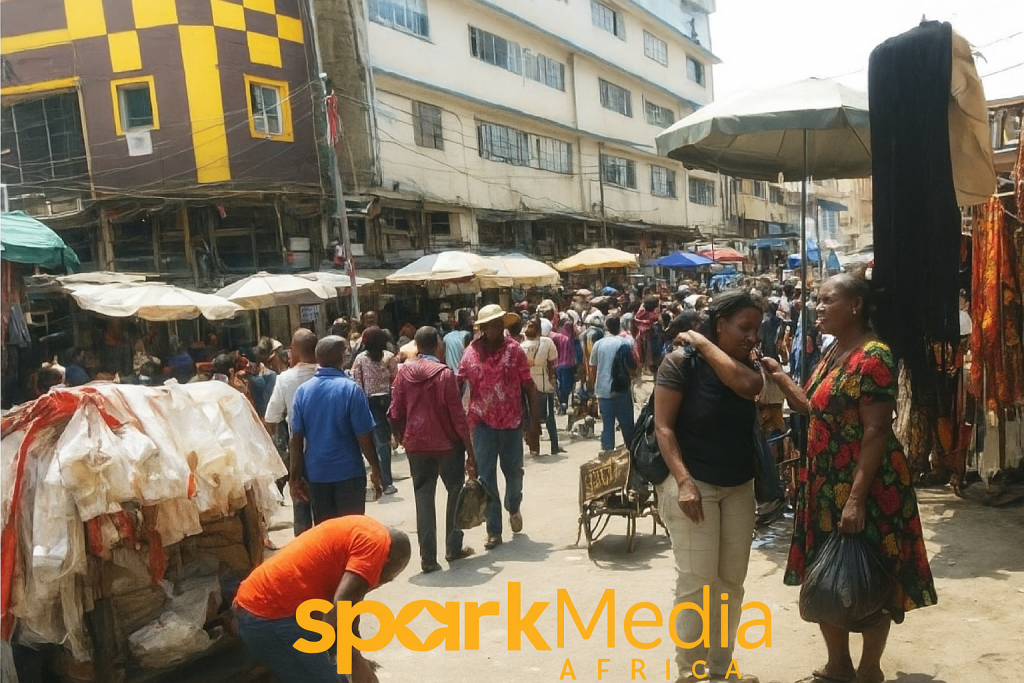
The N8,000 dispute Lagos market killing has shocked Lagos Island and beyond: what began as a simple argument between two Oso Ahia boys over commission escalated into a violent tragedy, claiming a young man’s life and exposing the volatile underbelly of informal street economies.
What started as a normal day of hustling, bargaining, and trading in the ever-busy streets of Lagos Island quickly spiraled into tragedy when two young hustlers—popularly known as Oso Ahia boys—allowed greed, pride, and rage to eclipse reason. Before the dust settled, a young man named Sodiq Ibrahim lay lifeless, stabbed during a bitter quarrel over money that should have bound brothers, not broken lives.
Balogun Market, located in the heart of Lagos Island, is not just a shopping center—it is a world of its own. Known for its sprawling stalls, chaotic streets, and endless streams of buyers and sellers, it thrives on a delicate ecosystem of traders, middlemen, transporters, and hustlers.
Among the most prominent figures here are the Oso Ahia boys—young men who make their living by “connecting” customers to shops. Their role is simple: identify buyers, persuade them into stores, and ensure purchases are made. In return, they earn a commission from the shop owners. But in this survival economy, where hundreds of hustlers compete daily for the attention of shoppers, conflicts over commission are inevitable.
According to a trader interviewed by Punch Newspaper, the system works because shop owners rely on these boys to bring business. However, “the sharing of commission can quickly cause quarrels when more than one hustler is involved.”
This tension reached its breaking point on August 23rd.
Eyewitnesses reported that a shopkeeper had handed two hustlers—Ebuka Adindu and Sodiq Ibrahim—a total of N8,000 commission after successfully making a sale. What should have been a moment of shared victory soon turned sour as disagreements arose over how to split the money.
Accounts vary on who struck first. Some witnesses claim that Sodiq, in a fit of rage, broke a bottle and stabbed Ebuka. Others insist that Ebuka, feeling cheated, went for his knife. What is clear is that within moments, Ebuka retaliated by stabbing Sodiq with a knife, hitting a vital spot.
“The deceased stabbed the guy first with a bottle … then the guy immediately pursued him with a knife, which led to him bleeding and later dying,” said Chigozie, a fellow hustler who witnessed the clash (Punch, 2025).
Tragically, Sodiq collapsed and died before medical help could arrive.
As news of the incident spread across Balogun Market and beyond, rumors quickly flooded social media, painting the tragedy as an ethnic clash between Yoruba and Igbo traders. Given Nigeria’s history of ethnic tensions, it was easy for false narratives to take root.
But traders within the market were quick to debunk such claims. According to Moshood, a trader:
“The fight started and ended with the Oso Ahia boys over the sharing of the commission. … There’s no tribal issue here. It was money that led to the dispute.” (Punch, 2025).
Another trader, Abiola Shittu, confirmed that while the incident caused some panic, the morning closure of shops was not due to violence, but because of a routine sanitation exercise carried out by Lagos State authorities.
The Lagos State Police also intervened swiftly, confirming that the matter was purely a personal dispute, not an ethnic crisis. Their investigation focused on locating and prosecuting the suspect responsible for the fatal stabbing.
For a few hours, chaos reigned in the market. Shops closed their doors, traders fled, and buyers avoided the area for fear of reprisal attacks. The once-bustling market fell silent under the weight of fear and uncertainty.
But Lagos markets are resilient. By afternoon, traders reopened their stalls, reassured by the police presence and the clarification that this was no ethnic war. Life resumed, though under a cloud of grief.
The death of Sodiq has since sparked conversations about the dangers of street hustling culture, where disputes over small amounts of money can escalate into deadly violence.
The tragedy at Balogun is not just about N8,000—it is about the harsh realities of survival in Nigeria’s informal economy.
With unemployment at troubling levels, many young men turn to street hustling as a means of survival. But hustling, by its nature, is highly competitive and unstable. Without formal agreements, arbitration, or conflict resolution mechanisms, disputes often turn violent.
Sociologist Dr. Olufemi Ojo, writing in The Guardian (2025), explained that:
“Street hustlers in Lagos are not just competing for customers—they are competing for survival. When life is reduced to a fight for daily bread, even small amounts like N8,000 can mean the difference between eating and going hungry. Violence becomes an unfortunate outlet for frustration.”
The Balogun tragedy is therefore not an isolated incident but part of a larger cycle of poverty-driven conflicts that regularly erupt in Lagos markets.